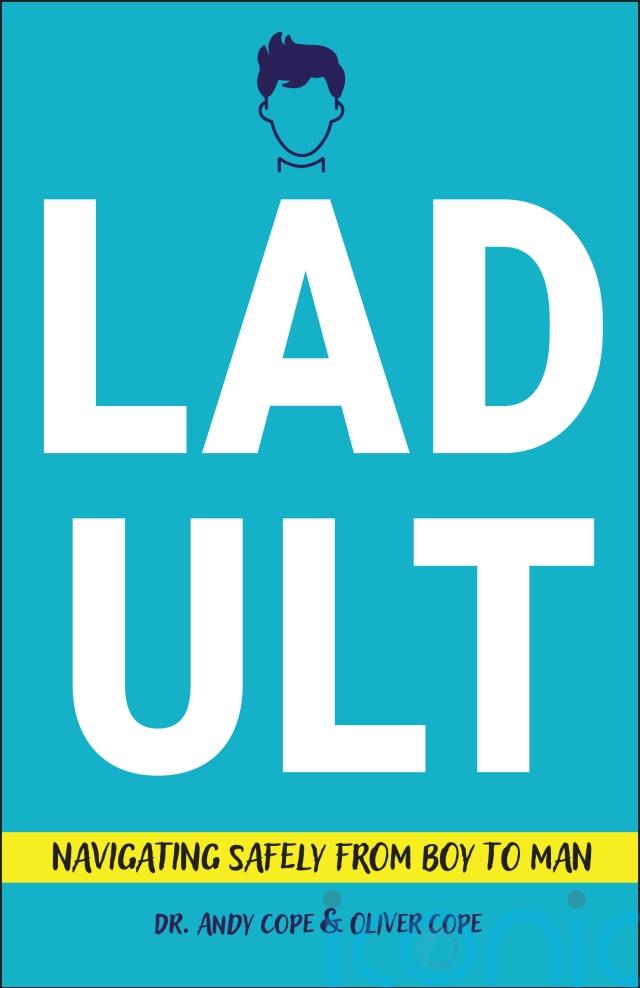
Teenage boys get a (sometimes justifiable) bad press, and it can be hard for some parents to see how these irresponsible and careless risk-takers can possibly transform into decent young men.
There’s no doubt that some of them could do with a bit of help – and father-and-son team Andy and Oliver Cope are hoping to provide that assistance through their new book, LADULT, which aims to help boys and young men grow in confidence, build helpful habits, spend less time glued to screens, upgrade their relationships, strengthen their resilience, and fulfil their potential.
The pair teamed up to write a teenage ‘survival guide’ because Andy has a PhD in positive psychology and is the UK’s first-ever ‘Dr of happiness’, so he can apply psychological principles to the book’s advice, while Oliver, 26, is completing a university thesis examining the link between social media and attention spans, and has the advantage of being a young man still in touch with how modern teenagers think and behave.

Pointing out that today’s teens have to cope with more than ever, including the impact of the pandemic, neurodiversity, gender fluidity, AI, the mental health crisis, fake news, screens and social media, Oliver says: “Teenagers have always had to deal with exams, relationships and the pressures of fitting in, but the modern world is punching harder.
“Lads are having to grow up in this swirling mass of confusion – it’s no wonder they’re getting lost.”
In the book, the authors say they want to help teenagers sift through the excess of information there is about being a man and help them make up their own mind about what kind of man they want to become.
They may, for example, strive to be cool. But the Copes say in the book: “We think it’s worth redefining ‘cool’. Being cool means knowing when to say ‘no’ when something doesn’t seem right. It’s about maintaining your values when others don’t. It’s having the courage to be nice in a society that occasionally glorifies cruelty.
“Cool is being the friend who makes sure everyone gets home safely after a party. It’s accepting that although you’re not to blame for how some other men behave, you do have the power to create positive change by role-modelling what’s right.”
Ultimately, Oliver points out that if becoming a good man was easy, then everyone would do it. “Your potential is one thing, what you do with it is another,” he says.
“Boys need a guiding hand – they need to learn it’s okay to fail, that confidence comes from within, and that happy-ever-after endings start with hard work now.”
1. Forge strong friendships
Adolescence is a crucial time for young men to develop their social muscles, although today a lot of teenage boys’ socialisation happens online through social media or video games, say the authors.
“While some social interaction is better than none, online interactions can’t compete with face-to-face socialising,” stresses Oliver. “Boys need to learn how to understand the nuances of other people’s expressions and gestures, learn to take and make jokes, to read the room, and to resolve conflict calmly. “
He suggests joining clubs to meet new people or taking part in face-to-face activities with friends outside of school are the best ways to hone these crucial skills.
2. Maximise family time

Screen-free meal times should be non-negotiable, says Oliver, pointing out: “It encourages presence over absence, and depth over small talk.”
He says research has found that family mealtimes at tables, and with no screens, boosts psychological wellbeing and improves social lives in young people, and their parents too.
“Eat face-to-face with your family every day, and you’ll get to understand them in ways you might have otherwise missed,” he says.
3. Set the right standards
Teenagers have always compared themselves to others, but social media has taken it into overdrive, says Oliver, who highlights the famous saying that ‘comparison is the thief of joy’.
“Now, instead of comparing yourself to the people around you, you’re comparing yourself to people whose entire job is to show off, using filters to improve their appearance and renting cars to show fake wealth,” he points out.
“This can leave you always comparing upwards or chasing the wrong thing, setting unrealistic standards of what it means to be happy or successful.”
He explains that while setting goals is important, they should come from discovering what you’re passionate about, “not what someone with a Ferrari or a six-pack tells you on Instagram.”
4. Rest your way to success

Over half of all teenagers are chronically under-sleeping, despite sleep being critically important for the teenage developing brain, stresses Oliver.
“Sleep is the chance for the brain to recover from the stresses of teenage life, and a good night’s sleep is critical for performance at school. Mobile phones and bedrooms do not mix – the endless supply of content on social media keeps your brain awake, while the blue light stops your brain from getting tired.
“The simplest solution for a good night’s sleep is to go old school, buy a real alarm clock, and charge the phone downstairs for a screen-free sleep.”
5. Praise for effort, not talent
Oliver says research shows children praised for natural talent soon give up when the going gets tough, whereas children who are praised for effort will keep going. So parents should be mindful to praise their child’s effort, not really their talent, and Oliver explains: “If your son scores a stunning goal don’t say, ‘Wow, you’re the next Messi’ but do say ‘Wow, that’s what you get for putting all that practice in.’”
6. Get ready to fail

Help your son prepare to fail – it happens to all of us. “There are times in life when things don’t go our way,” says Oliver. “Great men aren’t those who never make mistakes, but those who know how to accept their failings and learn from them.”
7. Dare to dream
Oliver points out that social media algorithms learn what you want to see before you know you want to see it. “It’s like they do the job of daydreaming for you,” he says. “Time spent fantasising and about where you want to be is vital to understand what you want to get out of life, so don’t leave these dreams to an algorithm – dream them for yourself.”

LADULT: Navigating Safely from Boy to Man, by Dr Andy Cope and Oliver Cope, is published by Capstone, priced £12.99. Available now.
Subscribe or register today to discover more from DonegalLive.ie
Buy the e-paper of the Donegal Democrat, Donegal People's Press, Donegal Post and Inish Times here for instant access to Donegal's premier news titles.
Keep up with the latest news from Donegal with our daily newsletter featuring the most important stories of the day delivered to your inbox every evening at 5pm.